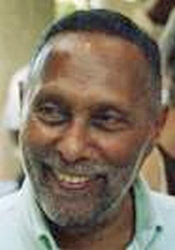
Back ستيوارت هال Arabic ستيوارت هال (منظر فنى من جاميكا) ARZ Stüart Holl Azerbaijani استوارت هال AZB Stuart Hall Catalan Stuart Hall (sociolog) Czech Stuart Hall Danish Stuart Hall (Soziologe) German Stuart Hall Esperanto Stuart Hall Spanish
Stuart Hall | |
|---|---|
 | |
| Born | Stuart Henry McPhail Hall 3 February 1932 |
| Died | 10 February 2014 (aged 82) London, England |
| Nationality | British |
| Known for | Founding New Left Review |
| Spouse | |
| Children | 2 |
| Academic background | |
| Alma mater | Merton College, Oxford |
| Influences | |
| Academic work | |
| Discipline | |
| School or tradition | Birmingham school |
| Institutions | |
| Doctoral students | Paul Gilroy |
| Notable students | Gregor McLennan |
| Notable ideas | Encoding/decoding model of communication |
| Influenced | |
| Website | www |
Stuart Henry McPhail Hall FBA (3 February 1932 – 10 February 2014) was a Jamaican-born British Marxist sociologist, cultural theorist, and political activist. Hall — along with Richard Hoggart and Raymond Williams — was one of the founding figures of the school of thought known as British Cultural Studies or the Birmingham School of Cultural Studies.[2]
In the 1950s Hall was a founder of the influential journal New Left Review. At Hoggart's invitation, he joined the Centre for Contemporary Cultural Studies (CCCS) at the University of Birmingham in 1964. Hall took over from Hoggart as acting director of the CCCS in 1968, became its director in 1972, and remained there until 1979.[3] While at the centre, Hall is credited with playing a role in expanding the scope of cultural studies to deal with race and gender, and with helping to incorporate new ideas derived from the work of French theorists such as Michel Foucault.[4]
Hall left the centre in 1979 to become a professor of sociology[5] at the Open University.[6] He was President of the British Sociological Association from 1995 to 1997.[5] He retired from the Open University in 1997[7] and was professor emeritus there until his death.[8] British newspaper The Observer called him "one of the country's leading cultural theorists".[9] Hall was also involved in the Black Arts Movement. Movie directors such as John Akomfrah and Isaac Julien also see him as one of their heroes.[10]
Hall was married to Catherine Hall, a feminist professor of modern British history at University College London, with whom he had two children.[3] After his death, Stuart Hall was described as "one of the most influential intellectuals of the last sixty years".[11] The Stuart Hall Foundation was established in 2015 by his family, friends and colleagues to "work collaboratively to forge creative partnerships in the spirit of Stuart Hall; thinking together and working towards a racially just and more equal future."[12]
- ^ a b c d e f g Dunn 2014, p. 758.
- ^ Procter 2004.
- ^ a b Morley, David; Schwarz, Bill (10 February 2014). "Stuart Hall Obituary". The Guardian. London. Retrieved 10 October 2021.
- ^ Schulman 1993.
- ^ a b Williamson, Marcus (11 February 2011). "Professor Stuart Hall: Sociologist and pioneer in the field of cultural studies whose work explored the concept of Britishness". The Independent. London. Retrieved 20 January 2022.
- ^ Hall 1996, p. 501.
- ^ Hall 1997, p. 24.
- ^ Drabwell, Christine (3 January 2020). "Sixty years ago: Stuart Hall arrives to renew the Left". The Open University | Society and Politics. Retrieved 9 April 2023.
- ^ Adams, Tim (22 September 2007). "Cultural Hallmark". The Observer. London. Retrieved 17 February 2014.
- ^ Julien, Isaac (12 February 2014). "In Memoriam: Stuart Hall". British Film Institute. Retrieved 10 October 2021.
- ^ Epstein 2019, p. 193.
- ^ "About Us". Stuart Hall Foundation. Retrieved 18 June 2022.